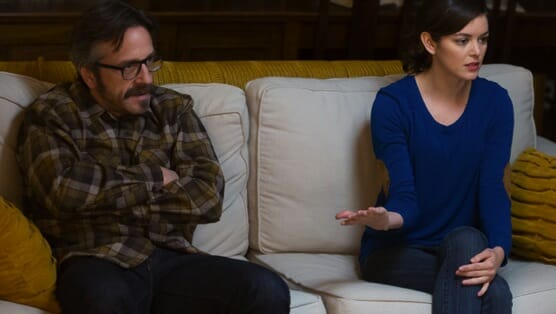
“Therapy,” the third episode of Maron’s second season on IFC, asks what should be a fairly simple question, all things considered: “How do you deal with your issues?”
We all have them, and they all manifest themselves with varying degrees of repercussions as a result. The show’s resident dad-grandpa (or “drandpa,” I guess), Marc Maron, and his twenty-ish-years-younger girlfriend Jen have always been very upfront about their issues—they’ve got a lot of them, and they talk about them a lot.
To some extent, the relationship—and the show, itself, really—seem to be entering a kind of “dysfunction stasis.” Marc’s messes recur like motifs in a symphony, but themes repeat…and repeat…and repeat. Alienation. Insufficiency. Fame, or lack thereof. But why should we have any sympathy if he’s not working to make things better?
It’s Jen’s 30th birthday, and her biological clock seems to be the ticking time bomb that sets this episode aflame. For Marc, a vacation to Hawaii seems like a suitable birthday present, but Jen is insistent on forcing him to prove his own seriousness about the relationship by impregnating her.
Honestly, the complaint—from a character Marc met halfway through last season on a “sex vacation”—is too far of a logical jump for me. While I’m sure that turning 30 could represent a kind of watershed signpost for anyone, Jen never seemed motivated by desires of this nature before, and it seems out of character for her. Multiple times this episode Marc calls Jen “a child,” and the idea of fathering hers would, of course, seem preposterous given that the fundamental incongruence of their relationship had been and always would be their age difference.
But for what it’s worth, when he’s alternating between petulant brattiness and self-absorbed depression, Marc seldom “acts his age” in any sort of traditional sense. The whole bit with podcast guest David Koechner—whose sole purpose on this episode seems to be depositing his digested huevos rancheros in Marc’s yard. [It’s funny that Marc even has to explain Koechner’s fame—he’s that guy from Anchorman and…uh…the other Anchorman.] It’s one of the more ineffective guest appearances in what has been a hit-or-miss format throughout the show’s run, though he does deliver a powerfully resonant line that hints at the tough truths Marc will come to realize before the half hour ends: “Be honest with yourself because that’s the only thing you have control over.”
To me, the idea of “control” was one of many hints at what was to come—much of the rhetoric throughout this episode (as well as its title) speaks to the inevitable therapy session, with which Marc seems to be fairly familiar. Pre-poop, Koechner suggests they “put the focus back on [Marc]”(as if he’d ever let it be anywhere else). In the episode’s opening moments, Maron encourages one of Jen’s drunk friends to “hit a meeting.” Unfortunately, his sobriety seems to be one of the few things Marc has any interest in taking seriously.
For better or worse, couples therapy winds up being a farce from the very beginning. While Paul Feig and Janet Varney are playing their parts admirably, it’s a little disappointing that they’re so ridiculous, particularly because it gives Maron a built-in out. If they’d been worth taking seriously, perhaps he’d have had to acknowledge the seriousness of what was at stake rather than being (understandably) petulant after his confidential confessions about Jen are repeated for her to hear.
Having the couples therapists winding up abusing their patients in an attempt to save their own flagging partnership is an unbelievably cynical—and, frankly, dark—outlook even for Maron. I get that they’re supposed to mirror Marc and Jen age-wise, but their characters (the harping wife and stuttering husband) aren’t fully-formed enough. Of course Marc sees right through them.
Post-therapy, things seem to have calmed down, though it becomes apparent that Marc and Jen’s problems are going to need more than a Roomba to sort out. Jen’s preoccupied with diagnosing Marc, wielding truisms and trying to peel back the layers of his psyche. They’ve found common ground in making fun of their therapists.
Ultimately, though, sex—the genesis of their relationship in the first place—winds up being the only thing they really have had in common. A relationship cannot abide between the sheets alone, though, and Jen’s out-of-nowhere request for a child damages the one thing they do well together.
One of the most striking moments is another dark turn—Marc’s conclusion that his penis is a “broken detector.” It says a lot about his thoughts about Jen, but at the same time, it’s sad to hear that, really, he seems to think his “broken detector” seeks out people damaged enough to care about him.
Back in therapy, he turns the tables on the therapists, wringing his hands with glee as he wreaks havoc on their carefully cultivated lies. Again, it’s too easy of a victory for someone so bent on making things harder for himself the rest of the time, but this time it winds up having some unintended consequences. This win and its craven malfeasance reveal his true self. He’s lowly, cruel and happy when others aren’t. Jen’s put up with a lot, but even this is too much.
At times over the first year, the show was allowed to stray into a heavier darkness that, if executed correctly, can set it apart. This might be the darkest it has allowed itself to get, and once he’s alone in his garage recording his monologue, Marc is honest about the reality of the relationship. They love each other, but it just isn’t going to work. Jen packs up and drives away. He was honest with himself. So was she. And that might be the end of that.
John Vilanova is a New York and Philadelphia based writer and academic currently serving as the managing editor of Philadelphia Style magazine. His work has appeared in publications including Paste, Rolling Stone, Vogue, and others. Follow him on Twitter.